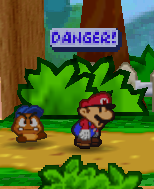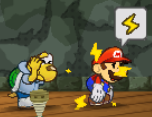Danger: Difference between revisions
Scrooge200 (talk | contribs) No edit summary |
|||
| Line 23: | Line 23: | ||
===''Paper Mario: The Origami King''=== | ===''Paper Mario: The Origami King''=== | ||
Danger appears in ''[[Paper Mario: The Origami King]]'' when Mario is at low HP. A red border pulses around the screen when Mario is selecting his attacks. It can also be inflicted on enemies, who have slower animations and orange name tags while in this state. In this game, the battle music remains normal and does not distort. | Danger appears in ''[[Paper Mario: The Origami King]]'' when Mario is at low HP. A red border pulses around the corners of the screen when Mario is selecting his attacks and in the overworld. It can also be inflicted on enemies, who have slower animations and orange name tags while in this state. In this game, the battle music remains normal and does not distort. | ||
==Gallery== | ==Gallery== | ||
Revision as of 17:37, May 30, 2024
Danger is a status effect that appears in all Paper Mario games. It occurs when Mario's or any of his Partner's HP reaches a specific low amount, causing a bubble with the words 'Danger' to appear above them. An alarm sound is also played on repeat to remind the player to use healing items. A similar status, Peril, also appears alongside it.
Appearances
Paper Mario
In Paper Mario, Danger is a status that automatically occurs when Mario’s HP is in the range of 2 to 5 points. If a character's HP reaches 1, however, Danger is overridden by the Peril status, which occurs with a similar, higher-pitched alarm playing. Several special badges are activated, namely Power Rush, Close Call, and Last Stand which will not lose their effect until the player is no longer in Danger. The player can allow Mario to always be in Danger by using Chet Rippo to lower his max HP to 5. By stacking Power Rush badges, Mario can do large amounts of damage to singular enemies.
Paper Mario: The Thousand-Year Door
The Danger status effect reappears in Paper Mario: The Thousand-Year Door. In this game, the special badges reappear along with new partner-only counterparts, which are Power Rush P, Close Call P, and Last Stand P. The partner badges are exclusive to this game, as partners are now given their own HP unlike in Paper Mario. These badges do not lose their effect when in Peril, and will actually stack with Mega Rush and Mega Rush P, the only Peril-activated badges. Like in Paper Mario, Mario and his partners can put themselves in Danger permanently by using Chet Rippo to lower their max HP.
In Paper Mario: The Thousand-Year Door, Mario can obtain a high amount of Power Rushes in the Pianta Parlor where they, or their P counterparts, can be bought for 34 pianta tokens each. This allows Mario or his partner to do up to 99 damage per hit on any given enemy.
Super Paper Mario
Danger appears again in Super Paper Mario, with a different criteria for activating. Instead of being activated by a character having 2-5 HP, it instead occurs when any given character has less than 20% of their max HP. As badges do not exist in this installment, Danger has no practical use other than to remind the player to heal themselves.
Paper Mario: Sticker Star
Danger in Paper Mario: Sticker Star happens when Mario has 30% or lower of his max HP. When in Danger, Mario assumes a slumped-over position and is seen panting. In this game, rather than an alarm sound playing, the battle music changes to a distorted, off-key version.
Paper Mario: Color Splash
In Paper Mario: Color Splash, Danger occurs when Mario is very low on HP. Like in Sticker Star, Mario has a tired expression and the battle music distorts. During Danger, the GamePad view has a red vignette border around the screen. Enemies in Danger also have different animations and appear heavily drained of their color.
Paper Mario: The Origami King
Danger appears in Paper Mario: The Origami King when Mario is at low HP. A red border pulses around the corners of the screen when Mario is selecting his attacks and in the overworld. It can also be inflicted on enemies, who have slower animations and orange name tags while in this state. In this game, the battle music remains normal and does not distort.
Gallery
Luigi in Danger in Super Paper Mario
Mario in Danger in Paper Mario: Sticker Star
Mario in Danger in Paper Mario: Color Splash
Mario in Danger in Paper Mario: The Origami King
Names in other languages
| Language | Name | Meaning | Notes |
|---|---|---|---|
| Japanese | ピンチ[?] Pinchi |
Pinch | |
| Chinese (simplified) | 危险[1] Wēixiǎn |
Danger | |
| Spanish | Peligro PELIGRO (The Thousand-Year Door alert bubble)[?] |
Danger DANGER |
References
- ^ From iQue's localization of Paper Mario: https://www.youtube.com/watch?v=qj23Urolr1I (1:31:43)





